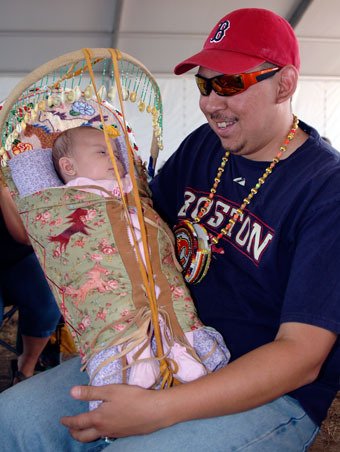TULALIP — With close to 100 teams and approximately 3,500 players, the second annual Battle of Nations Stick Game Tournament hosted by the Tulalip Tribes remained spirited and audibly enthusiastic through both days of play.
Although tournament organizer Rusty Farmer estimated that this year’s attendance numbers were down slightly from last year’s totals, he’d noted that last year’s event was “four times the size of any other event like this.”
The venue shifted slightly as well, from the Tulalip Amphitheatre last year to a tented area to the west of the Tulalip Resort Hotel and Casino on Aug. 20-21 of this year, but players, family and spectators from across the United States and Canada filled the space to overflowing with singing, drumming and ceremonial chanting.
Farmer explained that stick games, also called “Bone Games,” “Hand Game” or “Slahal,” predate recorded history as a traditional form of tribal trade, landholding and social networking, and were once played for land use, wives, lodging and goods such as clothing, horses and cattle, making them a form of trade and social bonding among Native peoples..
“We teach our youth and other players the pieces represent the player’s family,” Farmer said. “You have a clear bone which represents the wife, the mother and the female, and the striped bone that is the male, husband or dad. Then you have 10 sticks which are like your brothers, sisters, grandparents and the rest of your family. The object of the game is to bring your family together in unity, so when you play this game, you pray to your set and say, ‘I want my family to be together.’”
Although Slahal is a guessing game at its core, the event holds spiritual, cultural and social significance for Native peoples.
Johnny Arlee, a Flathead Indian, and Mary Ann Bearcomesout, a member of the Northern Cheyenne Nation, both came from Montana to attend the event for a second year. Both have been playing the game all their lives.
“It’s exciting and brings up good feelings,” Arlee said. “I like the focus on sobriety here. It’s fun to try my luck, and my grandson likes to play too.”
“I love the music and the beat,” Bearcomesout said. “When we were younger, it was a way of entertaining ourselves and keeping ourselves busy and out of trouble,” she laughed. “Each tribe has their own names for it and their own ways of playing. The Cheyenne only play with eight sticks. When we were younger, it was a chance to hang out with our elders. They would speak the same language as us to tell us jokes. It was a happy place to be.”
“The vision of our tribal leaders, both today and in generations past, has been to preserve and perpetuate our culture,” Tulalip Tribal Chair Mel Sheldon Jr. said. “We sponsor Spee-Bi-Dah, the Salmon Ceremony, the Canoe Journey, pow wows and other important events as these carry thousands of years of culture, history and spirituality. Our culture serves as an anchor for our membership and our youth and a source of identity, pride and permanence for all Native Americans in this modern world.”



